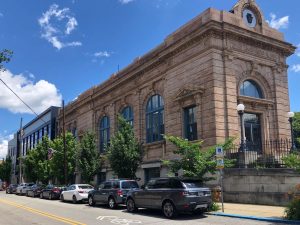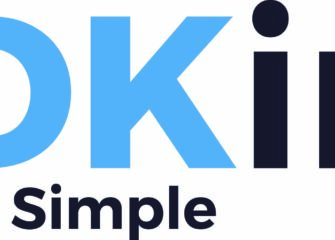
A Pittsburgh icon has a new reason to stand out. Two Doughboy Square, the former Pennsylvania National Bank Building, this week announced certification from the International WELL Building Institute (IWBI). It is the first WELL Certified Gold building in Pittsburgh and one of just six WELL Certified spaces in Pennsylvania. Desmone Architects designed the building and is headquartered inside.
“The former Pennsylvania National Bank Building is more than a hundred years old, but today it’s on the cutting edge of building design in the world,” said Eric Booth, President of Desmone Architects. “We have always believed that we can lift up the unique character of our neighborhood and prioritize health and wellness. This distinction proves it.”
Created through seven years of rigorous research and development working with leading physicians, scientists, and industry professionals, the WELL Building Standard is a performance-based certification system that marries best practices in design and construction with evidence-based scientific research. Two Doughboy Square earned the distinction based on seven categories of building performance — Air, Water, Light, Nourishment, Fitness, Comfort and Mind.
Desmone Architects completed dozens of upgrades as part of its WELL Certification. It overflows with life and light, which is regulated to harmonize with the circadian rhythms and natural daylight. Hundreds of plants decorate every part of the building. Special design features eliminate overflow noise from inside and out. Unseen, advanced filtration systems deliver high quality air and water – their status monitored constantly. Pittsburgh artist Baron Batch painted the mural that connects newly constructed space with the original structure.
Photos of the space are available here.
The Coronavirus Will Change the Future of Building Design
“The pandemic challenges all of us to think differently about how we live and work, and that means thinking differently about the buildings where we live and work. It’s more important than ever to be purposeful about our spaces and to make sure they enable people to thrive,” Booth said.
Two Doughboy Square is an early adopter of building design practices that reduce the spread of pathogens. The WELL Building Standard includes many design innovations that are likely to become mainstream in the wake of COVID-19:
· The building has high quality air filtration system available, with strict monitoring of air particulates. · All high-touch surfaces like doorknobs, tabletops and more are made from non-porous, easy-to-clean materials.
· Cleaning protocol meet rigorous standards for frequency and thoroughness. High-touch areas receive extra sanitization with an ultraviolet light wand. Cleaning equipment follows detailed specifications to reduce fomites.
· Easy-access hand-washing stations promote adherence to federal recommendations.
· Easy-clean cooling systems reduce microbe and bacteria growth.
Planning for the upgrade began more than a decade ago and construction began in 2017. Jendoco Construction Corporation completed the work, which quadrupled the total space from 8,200 square feet to more than 33,000.
About Desmone Architects
How do you want to live and work? Desmone Architects has used that question to serve clients since the firm was founded in 1958. With offices in Pittsburgh, Pennsylvania; Salisbury, Maryland; and Morgantown, West Virginia, Desmone’s projects include office and commercial development, hospitality, multi-family housing, higher education facilities, industrial and much more. The firm distinguishes itself by a commitment to listening to clients, using its extensive knowledge and skills to develop and enact their vision. For more information or see view a portfolio of work, visit desmone.com.
About the International WELL Building Institute
The International WELL Building Institute™ (IWBI™) is leading the global movement to transform our buildings and communities in ways that help people thrive. IWBI delivers the cutting-edge WELL Building Standard, the leading global rating system and the first to be focused exclusively on the ways that buildings, and everything in them, can improve our comfort, drive better choices, and generally enhance, not compromise, our health and wellness.



